Probiotics and Prebiotics Supplements
Probiotics and prebiotics are essential for gut health and overall wellness. Probiotics help our body balance good bacteria, aid digestion, and fight harmful microorganisms.
On the other hand, prebiotics nourish these beneficial bacteria, promoting their growth and activity, which can lead to improved digestion, nutrient absorption, and satiety. When combined, they work synergistically to optimize our gut microbiome. Incorporating both into your diet can be a natural and effective way to promote well-being.
In this article, we will take a closer look at prebiotic and probiotic supplement products, explore their health benefits and see how they can promote gut health.
Featured Products
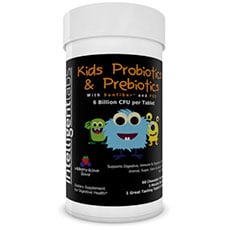
Kids’ Probiotics with Prebiotics
This supplement supports your child’s digestive and immune health and promotes cognitive development. It is safe and effective, providing a balanced gut flora for your child’s optimal health.
from $20.99
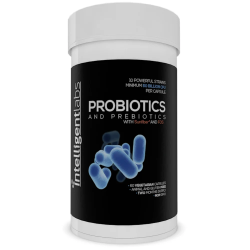
Probiotics and Prebiotics with Sunfiber® and FOS
Designed to improve digestive health and overall immunity. This comprehensive supplement promotes a healthy gut flora balance for optimal digestive health and immune function.
from $30.99
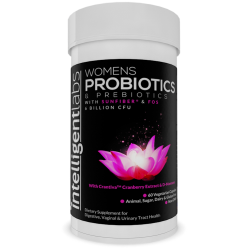
Women’s Probiotics and Prebiotics
Specially formulated to support women’s health. It combines probiotics and prebiotics to promote a healthy digestive system, boost the immune system, vaginal and urinary tract health, and support overall women’s health.
from $20.99
Table of Contents
What are Probiotics?

Probiotics are beneficial live microorganisms that contribute positively to our health when consumed in adequate amounts. Often known as “good” or “friendly” bacteria, they are crucial in maintaining a healthy gut environment.
Characteristically, probiotics belong to various strains of bacteria and yeast. The most common families of probiotic bacteria are Lactobacillus and Bifidobacterium. Each of these families comprises multiple different species and strains, each with its unique properties and health benefits.
One of the defining features of probiotics is their ability to survive the journey through our stomach and reach our intestines alive, where they exert their beneficial effects. Once there, they compete with harmful microbes for space and resources, help break down food into simpler substances, and support the body’s immune response.
In addition, probiotics are known for preserving the integrity of the gut lining, reducing inflammation, and even potentially alleviating certain diseases. They are an essential part of a balanced microbiome, contributing to overall well-being.
Role of probiotics in digestive health and immune function
When it comes to digestive health, probiotic supplements can help restore balance in the gut when unhealthy levels of certain bacteria are present. They secrete protective substances that can activate the immune system and prevent harmful pathogens from causing disease.
Moreover, probiotics can normalize bowel function by colonizing the digestive tract with adequate amounts and types of beneficial bacteria. They can also adhere to the walls of the digestive tract, forming a protective layer contributing to overall gut health.
In terms of immune function, probiotics regulate host innate and adaptive immune responses by modulating the functions of various immune cells, including dendritic cells, macrophages, and T and B lymphocytes. This regulation is often facilitated through the activation of toll-like receptors, which are a type of pattern recognition receptor that plays a key role in the innate immune system.
Furthermore, probiotics and prebiotics can impact the immune response to infections. The metabolites produced by probiotics and the commensal bacteria stimulated by prebiotics can reduce pH, leading to direct virucidal effects. This means they can potentially kill or inactivate viruses, further contributing to immune health.
Common strains of probiotics and their specific benefits
Common probiotic strains and their specific benefits include:
- Lactobacillus species
This group includes Lactobacillus acidophilus, casei, fermentum, gasseri, johnsonii, lactobacillus paracasei, lactobacillus rhamnosus, lactobacillus plantarum, and more. Lactobacillus acidophilus, for instance, helps balance potentially harmful bacteria in your gut that can flourish due to illness or antibiotics.
- Bifidobacterium
This group of bacteria includes Bifidobacterium longum, which supports digestion and the immune system and also helps relieve constipation. Another example is Bifidobacterium lactis HN019, which has shown immune benefits in studies.
- Saccharomyces boulardii
This is the most common yeast found in probiotics and is often used to treat diarrhea and other digestive problems.
What are Prebiotics?

Prebiotics are a group of nutrients that are degraded by gut microbiota. They are types of fiber that humans can’t digest, but bacteria can. Basically, prebiotics feed bacteria that support healthy digestion.
The most common environment where these beneficial microorganisms thrive is the gut. They are special plant fibers that help healthy bacteria grow in your gut, making your digestive system work better.
In contrast to probiotics, which are live microorganisms, prebiotics are non-viable substrates that serve as nutrients for beneficial microorganisms harbored in the gut. Prebiotics have a symbiotic relationship with probiotics – they serve as food for probiotics, which are tiny living microorganisms.
How prebiotics feed and support probiotic bacteria
Prebiotics are specialized plant fibers that act as nourishment for probiotics, which are the beneficial bacteria in your gut. The human body does not digest this dietary fiber, but it can be broken down and consumed by probiotic bacteria.
You can think of it this way: Probiotic supplements and foods add soldiers to your army of gut bacteria, and prebiotics provide the nourishment those soldiers need to stay healthy and strong.
Both prebiotics and probiotics support the gut microbiota, a community of microorganisms living in your intestines. This community performs many vital functions in the body, so maintaining a balanced amount of both probiotics and prebiotics can help ensure the health of your gut microbiota.
While prebiotics aren’t necessary for probiotics to work, consuming them can boost the effectiveness of your probiotics. This combined use of prebiotics and probiotics is referred to as microbiome therapy. It’s a way of ensuring that the beneficial bacteria in your gut have everything they need to support your health.
Common sources of prebiotics
Prebiotics naturally occur in a variety of plant-based foods. They can be found in certain fruits, vegetables, beans, and whole grains. Here are some common sources of prebiotics:
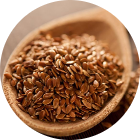
Flaxseeds:
These seeds are incredibly healthy and a great source of prebiotics. The fiber in flaxseeds promotes healthy gut bacteria.
Asparagus and Sugar Beet:
Both these vegetables naturally contain prebiotics that support the growth of beneficial gut bacteria.


Garlic:
part from its culinary uses, garlic is rich in prebiotics that foster a healthy gut environment.
Chicory and Onion:
Both chicory and onion are excellent sources of prebiotics.


Dandelion Greens:
Dandelion greens are high in fiber, including inulin, a type of prebiotic.
Oats, Nuts, Cabbage, Leeks, and Barley:
These foods naturally contain prebiotics, contributing to a balanced gut microbiome.
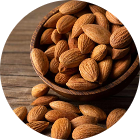

Jerusalem Artichoke and Wheat:
Both Jerusalem artichoke and wheat are good sources of prebiotics.
The Symbiotic Relationship

When you consume both prebiotics and probiotics, they work together to promote a healthy gut microbiome. The prebiotics provide nourishment for the probiotics, helping them to thrive and outnumber any harmful bacteria in your gut. This not only improves digestion but also supports a healthy immune system and may even influence your mood and energy levels.
Moreover, some foods contain both prebiotics and probiotics, making them synbiotics. These include foods like certain types of cheese, kefir, and yogurt. Consuming a balanced diet rich in these foods can help to foster a healthy gut environment.
Prebiotics and probiotics work together to support gut health by maintaining a balanced microbiota, aiding in nutrient absorption, supporting immune function, and more.
Balancing the Gut Microbiome
The gut microbiome refers to the community of trillions of bacteria and other microorganisms that live in our digestive tract. Maintaining a balanced gut microbiome is crucial for overall health. Here’s why:
- Digestion and Nutrient Absorption
- Immune System Support
- Mental Health Benefits
- Preventing Diseases
- Weight Management
Maintaining a balanced gut microbiome involves a healthy diet rich in fiber, regular exercise, adequate sleep, and stress management. Consuming probiotics and prebiotics can also support the health of your gut microbiome. Probiotics introduce beneficial bacteria to the gut, while prebiotics provide the nourishment these bacteria need to thrive. Together, they work symbiotically to maintain a healthy balance of gut bacteria.
Benefits of Probiotic and Prebiotic Supplements
Probiotic and prebiotic dietary supplements are becoming increasingly popular as a means to boost gut health and overall wellness. These supplements work hand-in-hand to nurture, replenish, and balance the gut microbiome – the community of beneficial microorganisms that reside in our digestive system. Here are some benefits worth exploring:
Digestive health improvements
Improving your digestive health can have profound effects on your overall well-being. Here is how probiotics and prebiotics can help support a healthy digestive system:
Better Nutrient Absorption: The gut microbiome plays a crucial role in breaking down food and absorbing nutrients. Probiotics help enhance this process, ensuring your body gets the most out of the food you consume.
Constipation Relief: A balanced gut microbiome can help alleviate constipation. Probiotics, in particular, have been shown to improve bowel regularity.
Reduced Bloating and Gas: Both probiotics and prebiotics can help reduce bloating and gas, common symptoms of an imbalanced gut microbiome.
Irritable Bowel Syndrome Management: Probiotics can help manage IBS symptoms, such as bloating, abdominal pain, and irregular bowel movements.
Balance Gut Microbiota: Prebiotics feed the beneficial bacteria in your gut, helping to maintain a balanced gut microbiome. This balance is key for optimal overall health.
Boosting immunity
Our immune system is inextricably linked to the health of our gut. In fact, a significant portion of our immune cells reside in the gut, making it a critical component of our body’s defense mechanism.
Probiotics and prebiotics strengthen the gut barrier, preventing harmful substances from leaking out of the intestines into the bloodstream. This helps to protect the body from potential infections.
Both probiotics and prebiotics can help reduce inflammation in the gut, which is beneficial for immune health. Chronic inflammation can affect the immune system, making your body less resilient to infections and diseases.
Probiotics compete with harmful bacteria for nutrients and space in the gut, thereby preventing their growth. Prebiotics, on the other hand, promote the growth of beneficial bacteria, which further helps in maintaining a healthy balance of gut microbiota.
Mental health implications (gut-brain connection)
The connection between the gut and the brain, often referred to as the “gut-brain axis,” is a rapidly growing field of research. This bidirectional communication system involves signaling between the gut microbiome and the brain, which can impact various aspects of mental health.
Many of the body’s neurotransmitters, such as serotonin and dopamine—which play significant roles in mood regulation—are produced in the gut. Certain strains of probiotics have been shown to influence their production.
The gut microbiome, known as the hypothalamic-pituitary-adrenal (HPA) axis, can impact the body’s stress response system. Imbalances in the gut microbiome may contribute to chronic stress levels and anxiety.
Emerging research suggests that the gut microbiome may also impact cognitive function, including memory and learning.
Weight management and metabolism regulation
Probiotics and prebiotics help optimize digestion by enhancing nutrient absorption and reducing inflammation in the gut. This can boost weight loss caused by nutritional deficiencies or chronic inflammation.
Some research indicates that probiotics and prebiotics may enhance feelings of fullness, which can help control appetite and reduce calorie intake, aiding in weight management.
Certain strains of probiotics have been shown to influence the genes and proteins involved in fat storage, potentially reducing the amount of fat stored by the body.
Other potential benefits
Heart Health: Certain probiotics may reduce blood pressure and LDL (“bad”) cholesterol levels, contributing to heart health.
Skin Health: Emerging research suggests a connection between gut health and skin conditions like eczema, acne, and psoriasis. Probiotics and prebiotics may help improve these conditions by reducing inflammation and enhancing the body’s immune response.
Bone Health: Some studies indicate that probiotics can enhance the absorption of minerals in the gut, including calcium, which is crucial for bone health.
Allergy and Asthma: Certain probiotic strains may reduce inflammation associated with allergies and asthma, potentially helping manage these conditions.
Oral Health: Probiotics may also be beneficial for oral health, helping prevent tooth decay, periodontal disease, and halitosis (bad breath).
Urinary and Vaginal Health: Probiotics may help prevent urinary tract infections and promote vaginal health by maintaining a healthy balance of bacteria in these areas.
What is the Difference Between Prebiotics and Probiotics
Prebiotics and probiotics both play essential roles in your gut health, but they serve different functions:
Probiotics are live beneficial bacteria that you can find in certain foods or supplements. They’re often referred to as “good” or “friendly” bacteria because they combat harmful bacteria in your gut, helping maintain a balanced gut microbiome.
Prebiotics, on the flip side, are types of dietary fiber that feed the friendly bacteria in your digestive system. Essentially, prebiotics act as food for probiotics, helping them thrive and multiply.
Choosing the Right Supplement

Navigating the world of probiotics and prebiotics can seem complex, given the vast array of options available. However, selecting the right dietary supplement can be a game-changer for your gut health, digestion, and overall well-being.
Tips on how to select quality probiotics and prebiotics
Selecting quality probiotics and prebiotics can feel overwhelming, given the number of options available. Here are some tips to guide you in making the right choice:
Importance of checking
The potency of probiotic supplements is measured in Colony Forming Units (CFUs), which refer to the number of live and active microorganisms in each dose. While there’s no one-size-fits-all recommendation for CFUs, a product with a higher count (in billions) is often considered more effective.
The role of packaging
Probiotics are live organisms and can be sensitive to elements like heat and moisture. Look for products that are well-packaged and are shelf stable to ensure the bacteria remain viable.
How to Use and Store?
Using and storing probiotics and prebiotics properly is crucial for maintaining their efficacy.
Probiotics: A typical starting dose is at least 25 billion CFUs per day for general gut health. The dose may be higher for specific health conditions, sometimes up to 50-100 billion CFUs.
Prebiotics: A typical dosage is up to 118 mg grams per day, but this can vary depending on the prebiotic and your individual needs.
Please note that these are general guidelines, and consulting with healthcare professionals for personalized advice is crucial.
Most probiotics should be stored in a cool, dry place away from direct sunlight. Some require refrigeration after opening, while others do not. Always check the product label for specific storage instructions to maintain potency. Prebiotics are generally more stable and can be stored at room temperature.
Probiotics and prebiotics are generally safe for most people but can cause side effects, especially when starting or increasing the dosage. These can include gas, bloating, upset stomach, and changes in bowel habits.
Signs of a quality product include detailed labeling of the types and strains of bacteria, CFU count at the time of expiration (not just manufacture), and storage instructions.
Probiotics and Prebiotics Supplements for Vegans

Vegan probiotics and prebiotics include only plant-based ingredients and processes, without animal products or by-products. They are suitable for vegans, people suffering from allergies, and everyone looking to boost their health with a conscious and clean supplement.
FAQ’s
Can you take probiotic and prebiotic together?
Yes, you can take probiotics and prebiotics together. In fact, doing so can potentially enhance the effectiveness of both.
What is a good prebiotic and probiotic to take?
The best supplement is always the one that satisfies your particular health requirements and includes different strains. Always consult with a healthcare professional before starting a new regime.
Is there a prebiotic and probiotic in one pill?
Yes, there are dietary supplements available that combine prebiotics and probiotics into one pill. These are often referred to as synbiotics.
What are the signs you need prebiotics?
If you’re experiencing digestive issues like bloating, constipation, diarrhea, or gas, adding prebiotics to your diet could potentially help improve your digestion.
